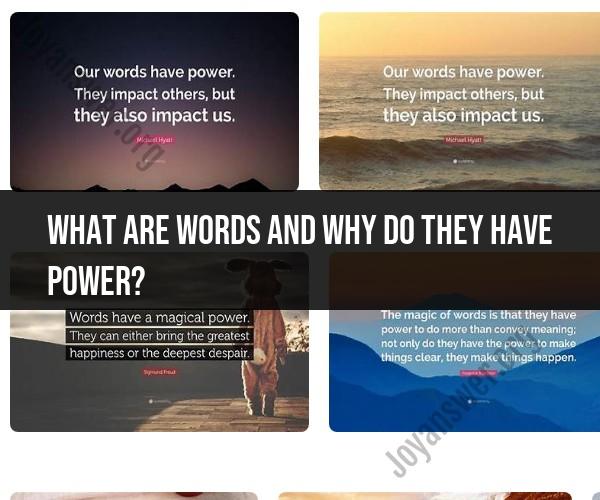What are words and why do they have power?
Words are the basic units of language, and they serve as a primary means of communication and expression in human societies. Words are composed of letters and characters that, when combined, convey meaning. They can be spoken, written, or expressed in various forms, including text, speech, sign language, and more.
Words have power for several significant reasons:
Communication: Words are the foundation of communication. They enable individuals to convey thoughts, ideas, emotions, and information to others. Effective communication is essential for building relationships, sharing knowledge, and understanding one another.
Expression of Thoughts and Emotions: Words allow people to express their thoughts and feelings. They provide a means to articulate complex concepts, tell stories, and communicate inner experiences. Through words, individuals can convey their joys, sorrows, fears, and aspirations.
Information Sharing: Words are a powerful tool for sharing information. They are used in education, journalism, and documentation to disseminate knowledge, news, and facts. This information-sharing capability is vital for personal and societal development.
Influence and Persuasion: Words have the power to influence and persuade. Effective communication can change minds, inspire action, and drive social change. Rhetoric, speeches, and persuasive writing are examples of how words can be used to sway opinions and mobilize people.
Documentation and Record-Keeping: Words are used to document history, laws, regulations, scientific discoveries, and cultural heritage. They create a written record of human experiences and knowledge, enabling the preservation of information for future generations.
Art and Creativity: Words are a medium for artistic expression. They are used in literature, poetry, song lyrics, and storytelling to create beauty, provoke thought, and inspire creativity. Words can evoke powerful emotions and imagery in the minds of the audience.
Identity and Connection: Words play a role in shaping identity and fostering connections. They can help people identify with a particular culture, community, or group. Shared language and vocabulary contribute to a sense of belonging.
Problem Solving: Words are essential for problem-solving and critical thinking. They allow individuals to describe issues, formulate hypotheses, and collaborate on finding solutions.
Empathy and Understanding: Words can foster empathy and understanding. By using words to describe one's experiences and perspectives, individuals can help others see the world from their point of view, promoting empathy and better interpersonal relationships.
Memory and Learning: Words are essential for memory and learning. They enable individuals to label and remember concepts, making it easier to acquire and retain knowledge.
Symbolism: Words can carry symbolic and cultural meanings. They can represent abstract ideas and values, such as freedom, justice, love, and peace, that have deep cultural and historical significance.
In summary, words have power because they are the foundation of human communication and expression. They shape our understanding of the world, influence our thoughts and actions, and enable the sharing of knowledge and culture. Words have the ability to inspire, inform, connect, and transform, making them a potent tool in the human experience.
The Influence and Significance of Words: Understanding Their Power
Words have a powerful influence on our thoughts, emotions, and behavior. They can be used to communicate ideas, persuade others, express feelings, and even shape our reality.
The power of words is evident in many different areas of our lives. For example, words can be used to:
- Build relationships and strengthen communities
- Convey information and knowledge
- Influence public opinion and political decision-making
- Create art and literature
- Heal and inspire
- Hurt and harm
It is important to be aware of the power of words and to use them responsibly. We should carefully consider the impact that our words may have on others before we speak or write.
Words as Tools of Communication, Persuasion, and Expression
Words are essential tools for communication, persuasion, and expression. We use words to share our thoughts, ideas, and feelings with others. We also use words to persuade others to see things our way or to take a particular action.
The way we use words can have a big impact on how others perceive us and how they respond to us. For example, if we use words that are respectful and considerate, we are more likely to build rapport and trust with others. If we use words that are persuasive and logical, we are more likely to convince others to agree with us.
Language's Role in Shaping Thoughts, Beliefs, and Culture
Language plays a vital role in shaping our thoughts, beliefs, and culture. The words we use influence the way we think about ourselves, the world around us, and our place in it.
For example, the words we use to describe certain groups of people can influence our attitudes and prejudices towards those groups. The language we use to talk about current events can shape our understanding of the world and our place in it.
Language also plays a role in preserving and transmitting culture. The stories, songs, and traditions that we pass down from generation to generation are all communicated through language.
The Weight of Words in Literature, Politics, and Everyday Life
Words have a significant impact on literature, politics, and everyday life.
In literature, words are used to create vivid imagery, evoke emotions, and tell stories. Words can also be used to challenge social norms and to explore complex ideas.
In politics, words are used to persuade voters, to shape public opinion, and to enact policy. Words can also be used to spread misinformation and to incite violence.
In everyday life, words are used to build relationships, to resolve conflict, and to express ourselves. Words can also be used to hurt and harm others.
The Ongoing Exploration of Language's Impact on Society
The impact of language on society is an ongoing area of exploration. Researchers are constantly learning more about how language influences our thoughts, emotions, and behavior.
This research is important because it can help us to better understand ourselves and the world around us. It can also help us to use language more effectively and responsibly.
Conclusion
Words are powerful tools that can be used to communicate, persuade, express, and shape our reality. It is important to be aware of the power of words and to use them responsibly.












